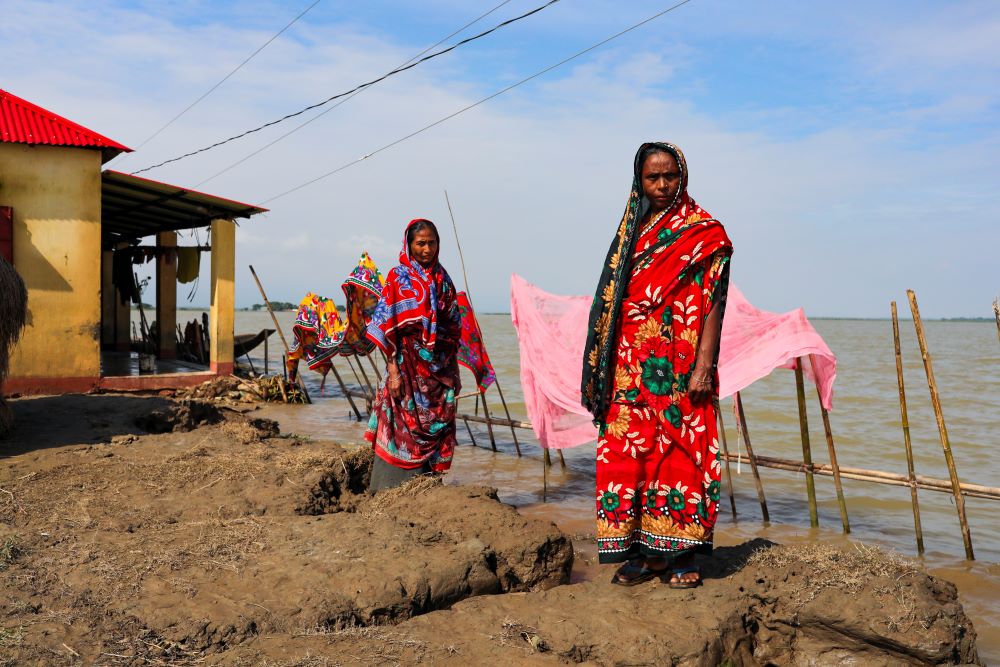Teresa Anderson is the global lead on climate justice at ActionAid International.
Imagine your wealthy neighbour has just driven their giant truck into your living room, destroying half your home.
But instead of offering to pay for the costs of the rebuilding, they just offer you a high-interest loan. You end up not only paying all the costs for the damage your neighbour caused to you, but also end up giving them money through the interest they earn off you.
That’s just crazy. That would never happen in real life, right?
Wrong.
That’s exactly what is happening when it comes to climate change.
And that’s why the UN COP29 climate negotiations in Baku, Azerbaijan this week and next will essentially determine whether or not we’re serious about putting our money where our mouths are to fix the climate crisis.
Rich nations “on track” to double adaptation finance but huge gap persists
Injustice of the climate crisis
The wealthy countries of the Global North have been industrialising for more than a century. In comparison, Africa, Asia and Latin America have produced far fewer of the emissions responsible for heating our planet today. Unfortunately for them, however, the warming of our planet has disrupted weather patterns in the Global South first and far worse. This is the fundamental injustice of climate change.
This year alone, Bangladesh has suffered three major destructive cyclones, as well as catastrophic floods. The most severe drought in 100 years means Malawi, Zambia and Zimbabwe are in a deepening hunger crisis. Floods in East Africa earlier this year affected 1.6 million people.
From cyclone to drought, Zimbabwe’s climate victims struggle to adapt
Events similar or worse than the recent terrible flooding in Spain have been happening for years across the Global South, but out of the international media spotlight. Meanwhile, the list of slow-onset climate impacts such as rising sea levels, disrupted rainfall, desertification and temperature grows steadily longer.
This means the costs of climate change are escalating. Countries in the Global South are being forced to repeatedly rebuild their schools, hospitals, roads and homes in the aftermath of disasters. Entire regions’ economic activities are put on hold while communities recover. Crop failures are leaving families hungry, and farmers without their livelihoods. The Global South is being pushed deeper into poverty by the climate impacts caused by others.
Twice more spent on ice cream
Frontline countries also know that in order to limit the harm from the droughts, floods and cyclones of the future they too need to invest in adaptation and resilience. And somehow, on top of all of this, also scale up renewable energy and green technologies to cut emissions. But with climate change pushing them deeper into debt, they simply can’t do it all.
You would think, then, that with climate disasters starting to be felt in the Global North, rich polluting countries would be motivated to pay for the climate harm caused to others, as well as action to prevent the crisis getting far worse.
Apparently not.
In 2022, the countries of the Global North only provided $28-35 billion between them in grants to support climate action in the Global South. For context, the global ice cream market share that year was $71 billion.
At the moment we’re paying twice as much for ice cream as we are for a liveable planet.
Even worse, rich countries seem to see the climate crisis as an opportunity for profit. They’ve been providing loans – often with high interest rates – to the countries desperate for any means to finance their recovery and transition. To add insult to injury, they insist on labelling these loans as “climate finance.”
But loans can actually worsen the climate crisis for low-income countries. Among climate-vulnerable counties, 93% are in or at risk of debt distress. Not only do indebted countries prioritise national revenue spending on debt repayment instead of climate action, but in order to earn foreign currency for debt repayment, they may often be forced to expand their fossil fuel developments and exports.
New climate finance goal
COP29 climate negotiations are set to agree a New Collective Quantified Goal on climate finance (NCQG), to boost climate action and protect communities in the Global South. To stop the spiral and move climate action forward, developing countries need developed countries to provide at least $1 trillion a year in grants. In fact, $5 trillion a year would be a fairer number, considering the decades of past damage that has been wreaked and paid for by the Global South.
But negotiations are fraught. Developed countries are keen to keep their grant-based contributions minimal, while blithely claiming that “private finance can fill the gap” and pushing the concept of a “multi-layered goal” that would count loans, corporate investments and all sorts of potentially exploitative private finance flows.
Rich countries are also trying to shift the responsibility onto others by demanding that the new goal require developing countries to contribute finance. Not only does this re-open a key Paris Agreement decision (not a can of worms we should be opening), but assumptions that countries like China have equivalent responsibilities to the Global North are simply not true. China’s cumulative historical per capita emissions – and thus financial responsibilities for fixing the climate – are still far below those of developed counties.
Rather than finger-pointing, the Global North needs to ask itself whether it genuinely wants to avert catastrophic climate change or not. In fact, the recent US election result means that giving our planet any chance of a safe future may require other developed countries to do more – not less – than their fair share.
Because the escalating crisis means that someone is going to have to pay at the end of the day. The question at COP is whether the bill lands at the door of those that are causing the damage, or those that suffer it.
